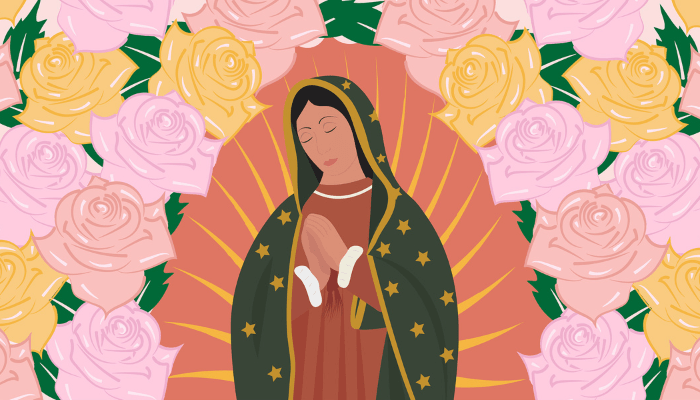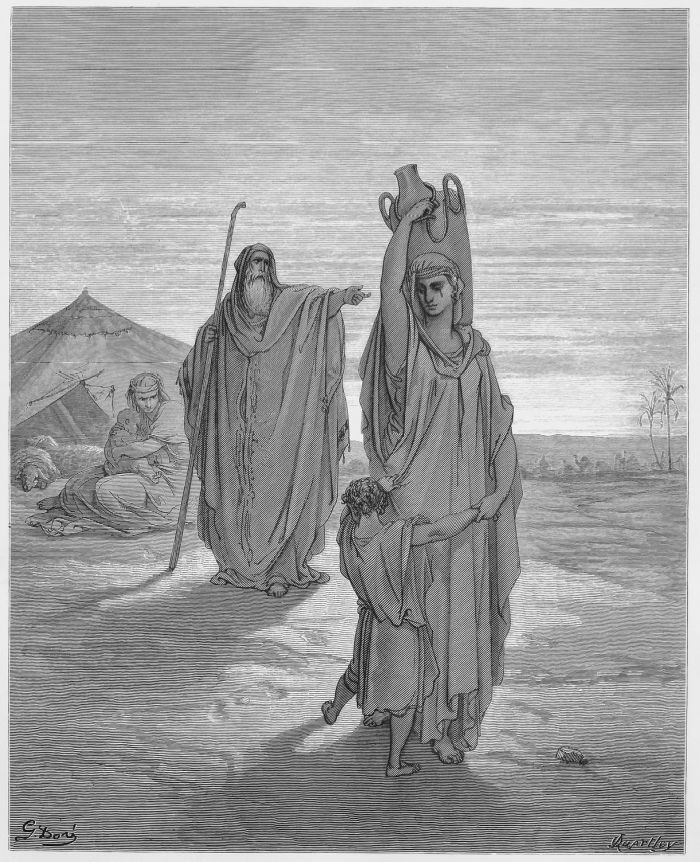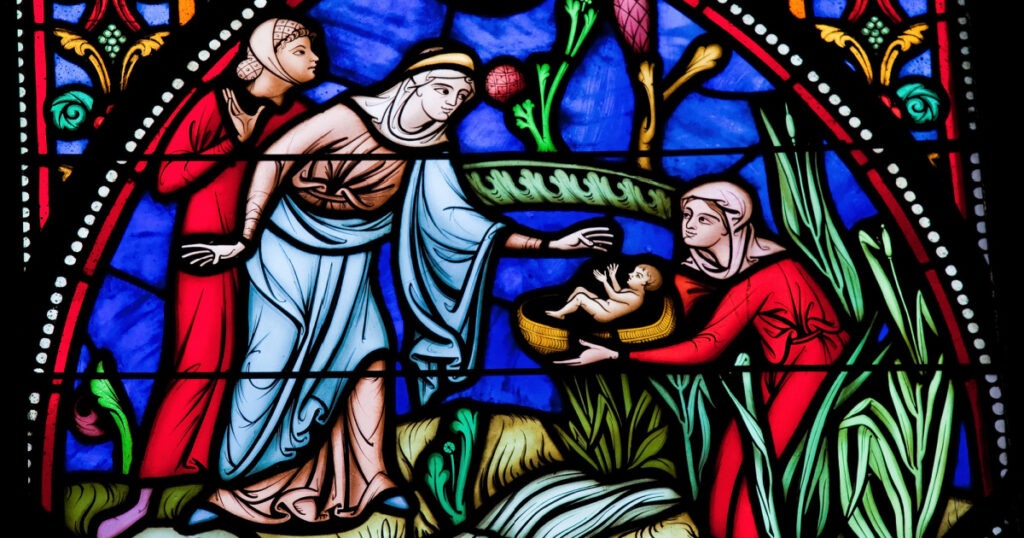Birth pain in the Bible begins in Genesis, ends in Revelation, and is used literally and metaphorically in both the new and old testaments. What do these verses and stories tell us about childbirth, birth pain, and the human experience? Let’s dive in.

Is Birth Pain a Curse?
The first place birth pain is mentioned in the Bible is the Genesis chapter 3 creation story. This is where the idea that women were cursed with painful childbirth as a result of not obeying God comes from.
I don’t remember ever hearing a sermon about women being cursed by God with pain in childbirth, but the idea is often tossed around and never challenged, as many women certainly feel cursed with having to deal with the pain of childbirth. But is that what the Bible actually says in Genesis 3:1-24?
What was cursed by God?
vs. 14 “The Lord God said to the serpent, cursed are you above all livestock”
vs. 17 “cursed is the ground because of you; in pain you shall eat of it all the days of your life”
A common misconception is that pain in childbirth is a curse from God, however, the two things that were cursed by God were the serpent and the ground. The woman was not cursed.
But what about vs 16?
vs. 16 “To the woman he said, “I will surely multiply your pain in childbearing; in pain you shall bring forth children. Your desire shall be contrary to your husband, but he shall rule over you.”
Turns out, the original language speaks to the emotional pain in raising children and being in a family, not the actual moment of childbirth. To read more about how pain in childbirth is not a curse from God, head on over here. I’ve got lots to say.
A Bible Birth Story with Childbirth Pain
Phinehas’s Wife
Once upon a time there was a priest named Eli who had two sons, Phinehas and Hophni. Eli wasn’t a very good priest or father, and his sons were the worst. One day his two sons were killed in battle and the ark of God was captured (which was a really big deal). Eli’s daughter-in-law was pregnant at the time and when she heard the news that her husband, brother-in-law, and father-in-law were dead, AND the ark was stolen, her labor pains began. Sadly, she died in childbirth, but her son, Ichabod, lived on.
Here are the Bible verses from 1 Samuel that mention birth pain.
“Now his daughter-in-law, the wife of Phinehas, was pregnant, about to give birth. And when she heard the news that the ark of God was captured, and that her father-in-law and her husband were dead, she bowed and gave birth, for her pains came upon her. And about the time of her death the women attending her said to her, “Do not be afraid, for you have borne a son.”
But she did not answer or pay attention. And she named the child Ichabod, saying; “The glory has departed from Israel!” because the ark of God had been captured and because of her father-in-law and her husband.” 1 Samuel 4:18-21

Birth Pain in the Bible as a Metaphor
Birth pain in the Bible is not merely restricted to the physical act of childbirth but extends to challenges faced in various situations. The majority of the references to birth pain in the Bible are a metaphor for scenarios involving men, ironically, in their fear and sufferings, typically resulting from their sin. The following are bible verses mentioning the pain of labor.
New Testament Bible Verses that Mention Birth Pain
“When the kings joined forces, when they advanced together, they saw her and were astounded; they fled in terror. Trembling seized them there, pain like that of a woman in labor.” Psalm 48:4-6
“I hear a cry as of a woman in labor, a groan as of one bearing her first child” Jeremiah 4:31
“Anguish has gripped us, pain like that of a woman in labor.” Jeremiah 6:24
“Will not pain grip you like that of a woman in labor?” Jeremiah 13:21
“Ask and see: Can a man bear children? Then why do I see every strong man with his hands on his stomach like a woman in labor, every face turned deathly pale?” Jeremiah 30:6
“Kerioth will be captured and the strongholds taken. In that day the hearts of Moab’s warriors will be like the heart of a woman in labor.” Jeremiah 48:41 (the heart of a woman in labor here is describing someone in fear)
“Damascus has become feeble, she has turned to flee and panic has gripped her; anguish and pain have seized her, pain like that of a woman in labor.” Jeremiah 49:24
“Anguish has gripped him, pain like that of a woman in labor.” Jeremiah 50:43
“As a pregnant woman about to give birth writhes and cries out in her pain, so were we in your presence, Lord.” Isaiah 26:17
“The guilt of Ephraim is stored up, his sins are kept on record. Pains as of a woman in childbirth come to him, but he is a child without wisdom; when the time arrives,he doesn’t have the sense to come out of the womb.” Hosea 13:12-13

New Testament Bible Verses that Mention Birth Pain
Birth pain is also used as a way to convey temporary suffering. For example, Jesus used birth pain as a way to explain to his disciples that there would be suffering ahead, but that eventually they would be reunited and suffering would be a thing of the past. Paul used it as a way to express his season of frustration with the early Christians in Galatia regarding their immature faith. Here are some New Testament verses on biblical childbirth.
“A woman giving birth to a child has pain because her time has come; but when her baby is born she forgets the anguish because of her joy that a child is born into the world. So with you: Now is your time of grief, but I will see you again and you will rejoice, and no one will take away your joy.” John 16:21-22
“We know that the whole creation has been groaning as in the pains of childbirth right up to the present time.” Romans 8:22
“My dear children, for whom I am again in the pains of childbirth until Christ is formed in you, how I wish I could be with you now and change my tone, because I am perplexed about you!” Galatians 4:19-20
(Honestly, I find these metaphorical verses interesting because it sheds light on what men think (thought?) childbirth is like – filled with anguish, pain, groaning, and suffering. I personally don’t see childbirth in that light AT ALL. I see childbirth as a rite of passage, character building, life altering, empowering, and a sacred body, heart, and soul experience. But maybe that’s just me. 😉)

Apocalyptic Birth Pain
Of course, birth pain in the Bible is used as a metaphor for the signs that the end times, or apocalypse, is coming. Just as contractions signal the beginning of early labor, things like wars, famines, and earthquakes signal the beginning of the end.
“As Jesus was sitting on the Mount of Olives, the disciples came to him privately. “Tell us,” they said, “when will this happen, and what will be the sign of your coming and of the end of the age?”
Jesus answered: “Watch out that no one deceives you. For many will come in my name, claiming, ‘I am the Messiah,’ and will deceive many. You will hear of wars and rumors of wars, but see to it that you are not alarmed. Such things must happen, but the end is still to come. Nation will rise against nation, and kingdom against kingdom. There will be famines and earthquakes in various places. All these are the beginning of birth pains.” Matthew 24:3-8

Bible Verses for Birth
Having a baby is not a separate life event. If faith and spirituality is part of a woman’s every day, normal life, it would make sense that it would be an important part of her birth as well.
Use these 30 curated bible verses for labor and delivery to bring comfort during the end of pregnancy and throughout the intensity of any type of birth – natural birth, medicated, or a cesarean birth.
Old and new testament bible verses for labor are a simple way to bring faith and spirituality to each moment, contraction, and breath during birth. Use them during pregnancy, as soon as signs of labor begin, and throughout the whole birthing experience.

Understanding Birth Pain in the Bible
Birth is mentioned at the beginning of the Bible (Genesis), the end (Revelation), and everywhere in between, and is a massive part of the human experience. Birth pain is not a curse, but is often used as a way to signify the beginning of something beautiful and new (like new life), but to also sometimes convey its end.
